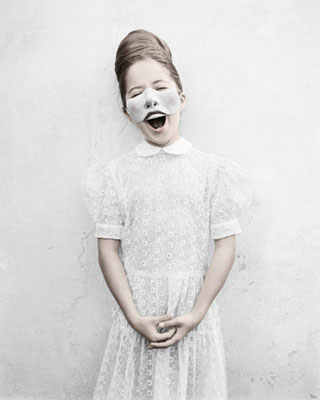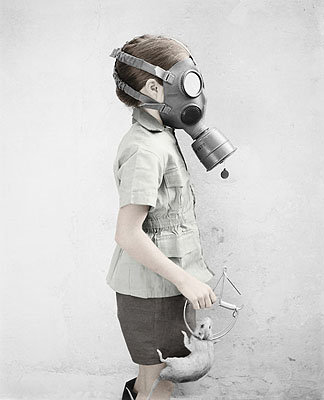
Untitled #1, 2007
C-Print hinter Diasec auf Aludibond
95 x 70 cm
Courtesy Galerie Anita Beckers, Frankfurt
Vee Speers »
The Birthday Party
Exhibition: 16 Feb – 5 Apr 2008

Galerie Anita Beckers
Braubachstr. 9
60311 Frankfurt (Main)
+49 (0)69-92101972
info@galerie-beckers.de
www.galerie-beckers.de
Tue-Fri 11-18, Sat 12-17

Untitled #6, 2007
C-Print hinter Diasec auf Aludibond
95 x 70 cm
Courtesy Galerie Anita Beckers, Frankfurt
You Aren't Happy At All! Vee Speers' "Birthday Party" Series The list of photo artists who have taken the theme of childhood for themselves is long. That's understandable, for it is a rewarding photographic subject. What's fascinating is the position of in-between, the ambiguity of being a child: The child's ego is fragile, there are plenty of options. Is this only at the beginning: in a paradisiacal state, as has often been written? When Vee Speers places children in front of the same white wall to photograph them in their costumes for the "Birthday Party" series, one might at first wonder about this visual concept. We tend to associate childhood with spontaneous movement rather than immobility. This is different with Vee Speers: Her models act within a strictly laid-out frame. Lisette Model was one of the first female photo artists to take pictures of young people not only in their freedom of movement but also in regard to their future roles. Childhood is a period of time in which one practices taking on roles - something which Vee Speers' "Birthday Party" series also explores. It's not that their role corsets are already threatening to overpower them, since the children depicted here are anything but free and innocent. They stand in their fantastic costumes, but don't look very cheerful. "Aren't you happy at all?", you want to ask them. And although some of them are even smiling or singing, they don't appear to be truly happy. They open themselves to the camera with gazes that say to us grown-ups: Look at us. We know much more than you think. Are they representatives of the much-cited "lost childhood" that photographers such as Achim Lippoth have portrayed in such a captivating way? The Cologne artist photographed children with expressions full of hate, children much too grown-up for their age, for example, such as the Chinese gymnasts he portrayed in his series titled "L'homme Machine" - machine people. They are mutants of the adult world, premature ones, but still in the bodies of children. The guests of the imaginary birthday party have not yet entirely detached themselves from their childhood. It is not childlike happiness that is revealed in their regard, but pressing openness. Carefree childhood, purity, naturalness...it's all a cliché - that's what these image impart. Irritation is programmatic here; Vee Speers' art is meant to confuse: Be it the small child soldier - does he have a real machine gun? - or the girl opening her palms as if to say: All I have in this world is myself. As openly as they look at the camera, the children reveal very little of themselves. Standing in front of a white background, they are symbols of...they won't say of what. And this is precisely what makes these portraits so magnetic: The children do not divulge their secret, the reason for their forlornness. "I'm interested in the psychology of human nature - what we really are beneath the surface," Speers once said. Yet she creates her art in the certainty of never being able to expose what lies beneath. "I wanted to capture the last moments of childhood by means of an imaginary party," says Speers. What she has cast in strange, pale colour photos is an ambivalent state between freedom and role play, between spontaneity and premonition (later on I will be a sad old witch!), between the world of children and the world of adults. The childlike game of dressing up, of putting on costumes, reinforces the surreal tone of the series. Boxing gloves alone don't make a boxer, a helmet doesn't make a Roman legionnaire. That's what Vee Speers tells us. But we should indeed think more frequently about the dreams we have. Marc Peschke (Art historian and culture journalist, Wiesbaden & Hamburg. www.marcpeschke.de)
Du freust Dich ja gar nicht! Vee Speers Serie "Birthday Party" Die Liste jener Fotokünstler, welche die Kindheit als Thema für sich entdeckten, ist lang. Das kann man verstehen, denn sie ist ein lohnendes fotografisches Sujet. Es ist die Zwischenposition, das Uneindeutige am Kind-Sein, das fasziniert: Das Selbst des Kindes ist fragil, es stehen Möglichkeiten offen. Es ist erst am Anfang: ein, wie oft geschrieben worden ist, paradiesischer Zustand? Wenn Vee Speers für ihre Serie "The Birthday Party" Kinder vor eine immer gleiche weiße Wand stellt, um sie in ihren Kostümierungen zu fotografieren, dann mag diese Bildidee anfangs verwundern. Mit Kindheit assoziieren wir eher spontane Bewegung als Statik. Bei Vee Speer ist das anders: Es gibt einen streng festgelegten Rahmen, in dem ihre Modelle agieren. Eine der ersten Fotokünstlerinnen, die junge Menschen nicht in ihrer Freizügigkeit, sondern hinsichtlich ihrer zukünftigen Rolle fotografierte, war Lisette Model. Die Kindheit ist eine Zeitspanne, in der man sich übt, Rollen einzunehmen - davon erzählt auch Vee Speers Serie "Birthday Party". Nicht, dass ihr Rollenkorsett schon übermächtig zu werden droht, dennoch sind die hier Gezeigten alles andere als frei und unschuldig. Sie stehen da, in ihren phantastischen Kostümen, doch sehen sie gar nicht glücklich aus. "Ja, freust Du Dich denn gar nicht?", will man sie fragen. Doch nein, auch wenn manche von ihnen sogar lächeln oder lachen. Wirklich froh scheinen sie nicht. Sie öffnen sich der Kamera mit Blicken, die uns Erwachsenen sagen: Schaut uns an. Wir wissen doch viel mehr, als Ihr glaubt. Sind sie Vertreter jener vielzitierten "verschwundenen Kindheit", die Fotografen wie Achim Lippoth auf faszinierende Weise ins Bild brachten. Der Kölner fotografiert Kinder mit hasserfüllten Mienen, die viel zu erwachsen sind für ihr Alter, wie etwa seine in China porträtierten Turner der Serie "L'homme Machine" - Maschinenmenschen. Sie sind Mutanten der Erwachsenenwelt, früh Gereifte, die aber noch in kindlichen Körpern stecken. So ganz haben sich die Besucher der imaginären Geburtstagsparty ihre Kindheit noch nicht abgeschminkt. Dennoch: Aus ihren Gesichtern spricht keine kindliche Freude, sondern dringliche Offenheit. Die unbeschwerte Kindheit, Reinheit, Unbefangenheit, das alles ist ein Klischee, das erzählen diese Bilder. Irritation ist hier Programm, diese Kunst soll verwirren: Sei es der kleine Kindersoldat - hat er ein echtes Maschinengewehr? - oder das Mädchen, das seine Handflächen öffnet, als wollte sie sagen: Ich habe nichts als mich selbst in dieser Welt. So offen sie die Fotografin Vee Speers auch anblicken, dennoch geben diese Kinder wenig von sich preis. Vor weißem Hintergrund stehen sie, Symbole für: Das sagen sie nicht. Und genau hier liegt der große Reiz dieser Porträts: Die Kinder geben ihr Geheimnis nicht preis, den Grund ihrer Verlorenheit. "Ich interessiere mich für das Mensch-Sein, für die Psychologie der Menschen - was wir unter der Oberfläche wirklich sind", hat Speers einmal gesagt. Doch ihre Kunst fertigt sie in der Gewissheit, jenes Darunter niemals offenlegen zu können. "Ich wollte die letzten Momente der Kindheit mit einer imaginären Party einfangen", sagt Speers. In merkwürdig blasse Farbfotografien gegossen hat sie einen ambivalenten Zustand zwischen Freiheit und Rollenspiel, zwischen Spontaneität und böser Vorahnung (später bin ich eine traurige, alte Hexe!), zwischen Kinder- und Erwachsenenwelt. Das kindliche Spiel des Verkleidens, die Kostümierung, verstärkt die surreale Note der Serie. Ein Boxhandschuh macht noch keinen Boxer, ein Helm noch keinen römischen Legionär. Davon erzählt Vee Speers. Aber darüber, welche Träume wir haben, sollten wir öfter nachdenken. Marc Peschke (Kunsthistoriker und Kulturjournalist, Wiesbaden & Hamburg. www.marcpeschke.de)